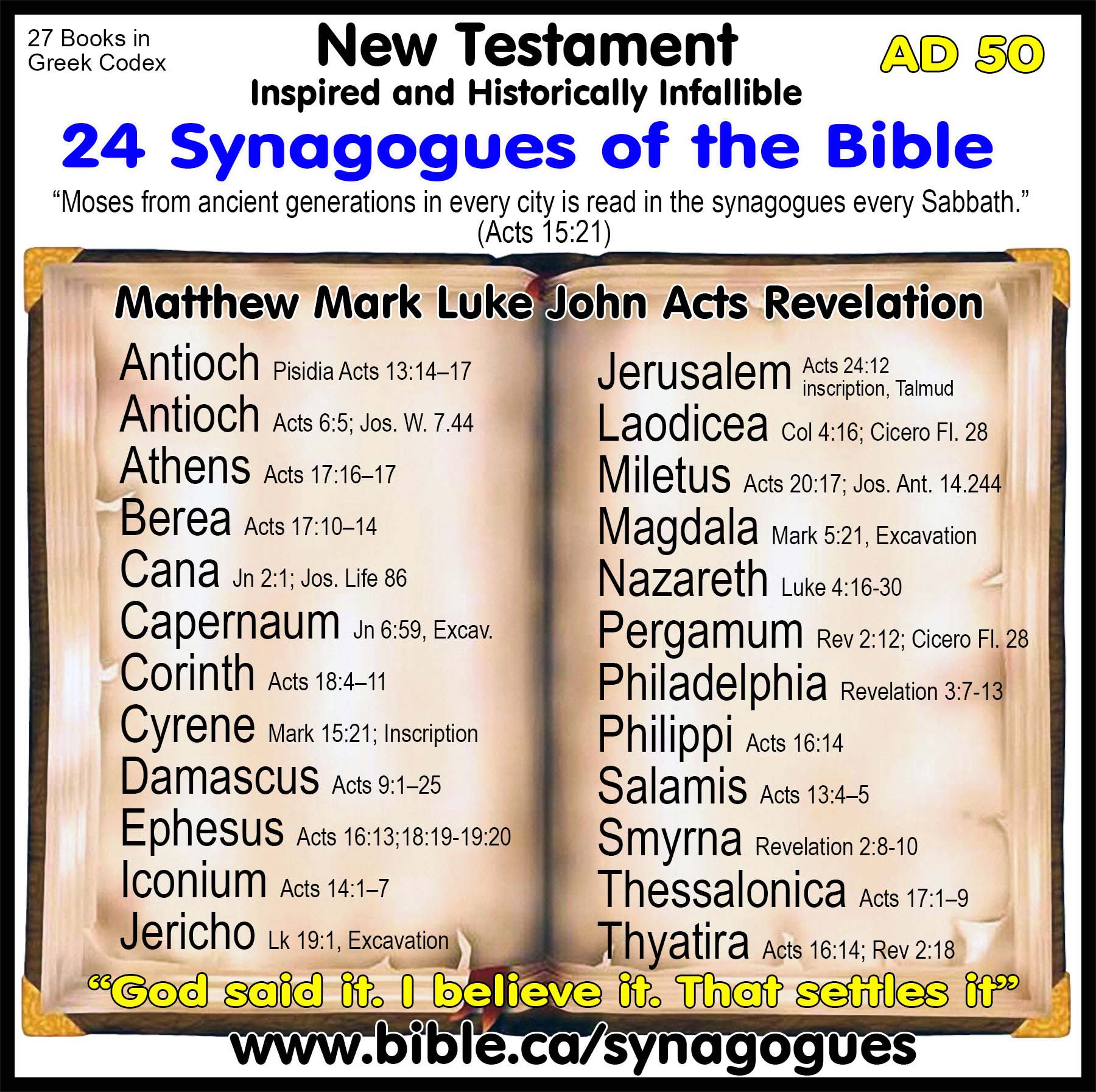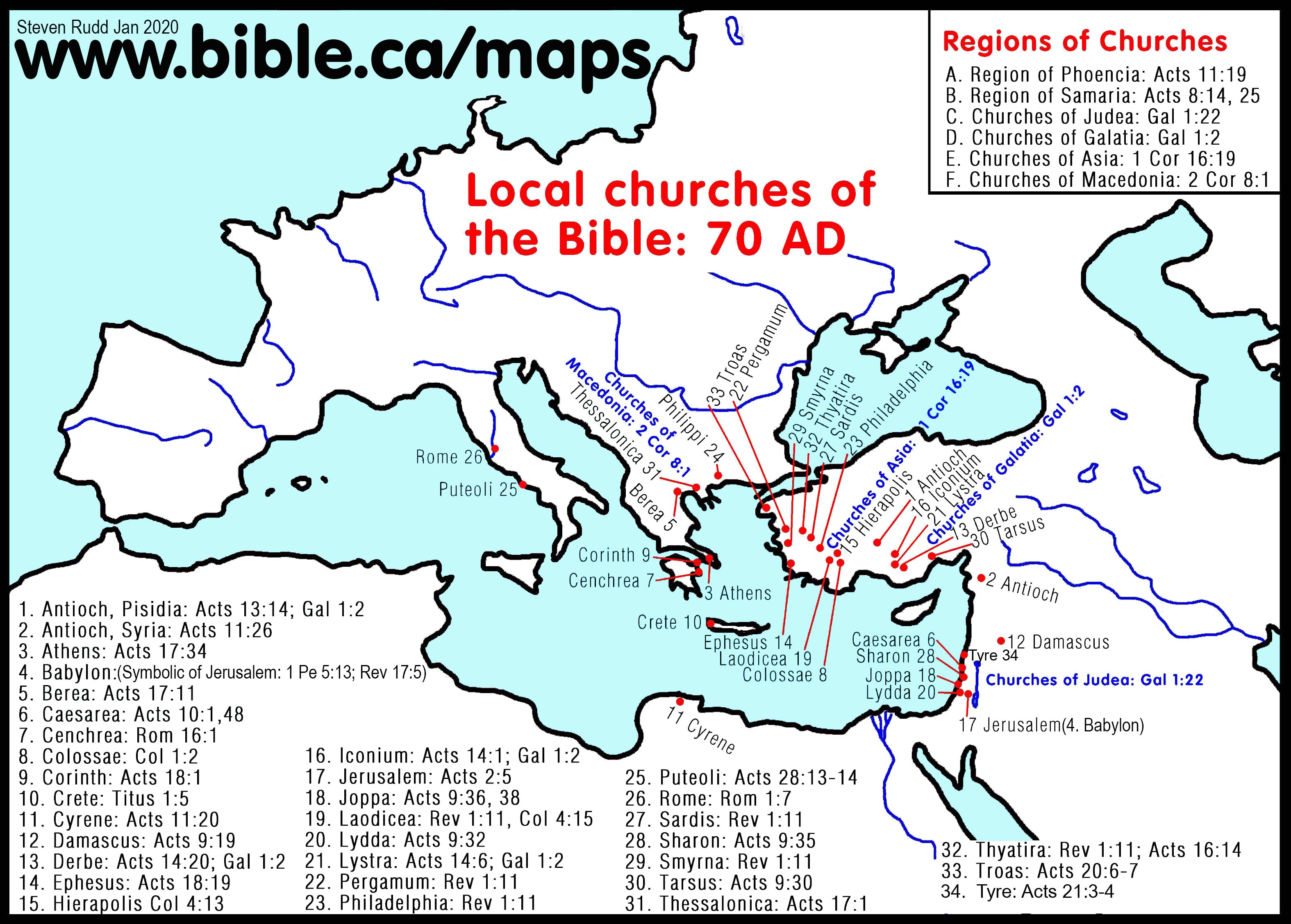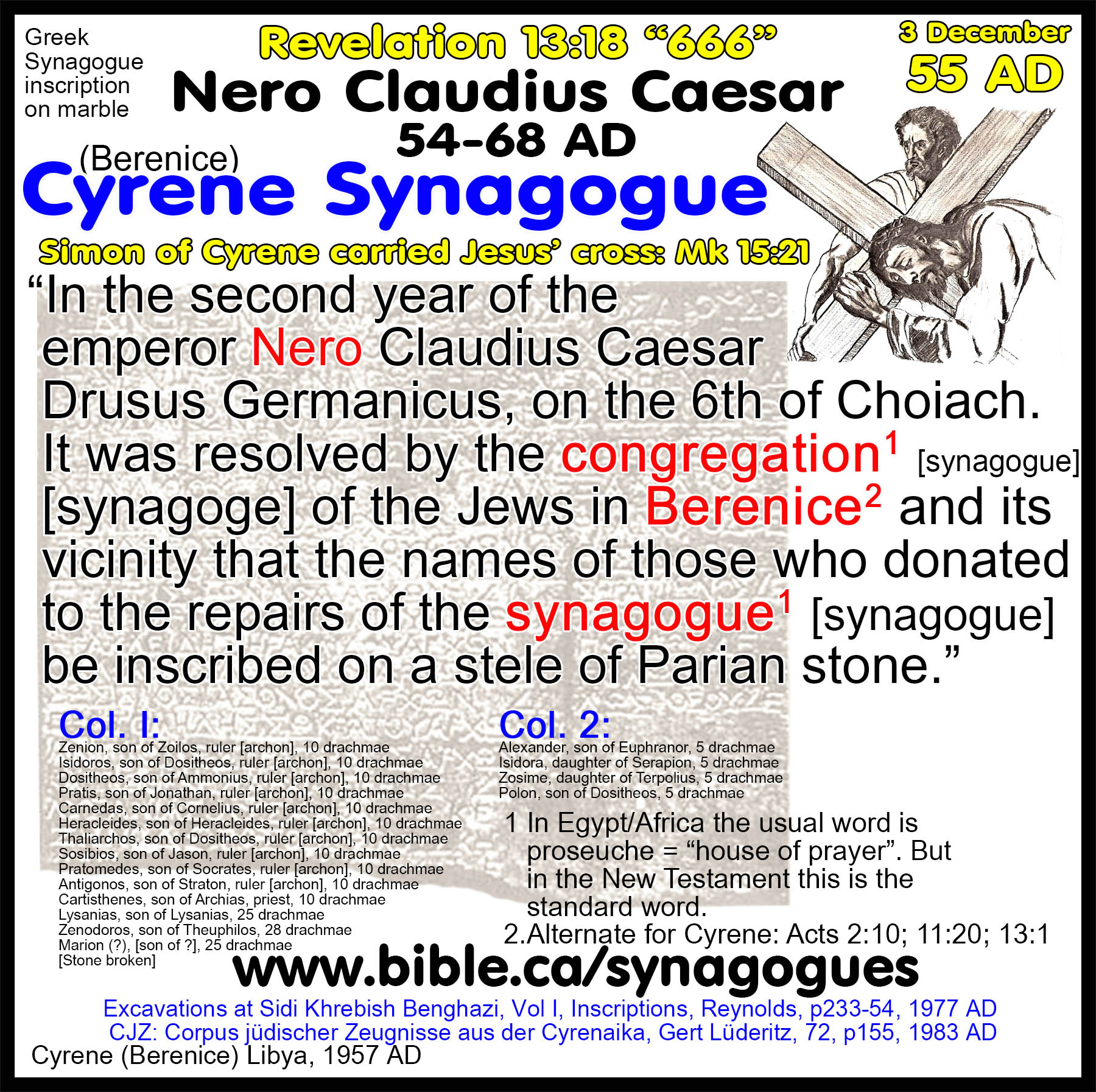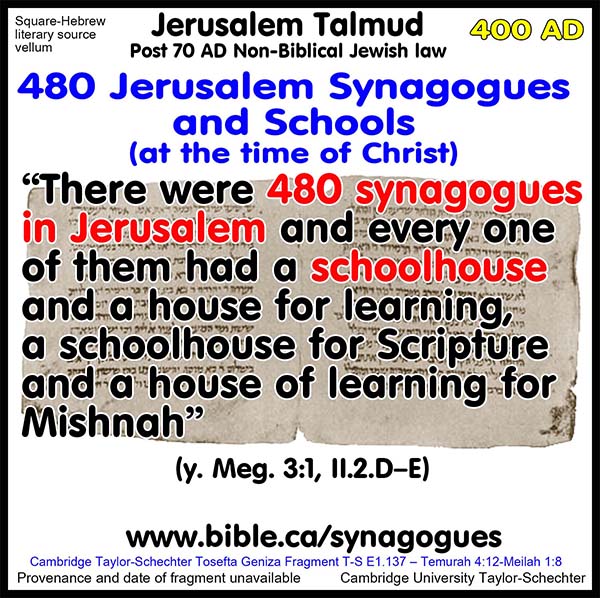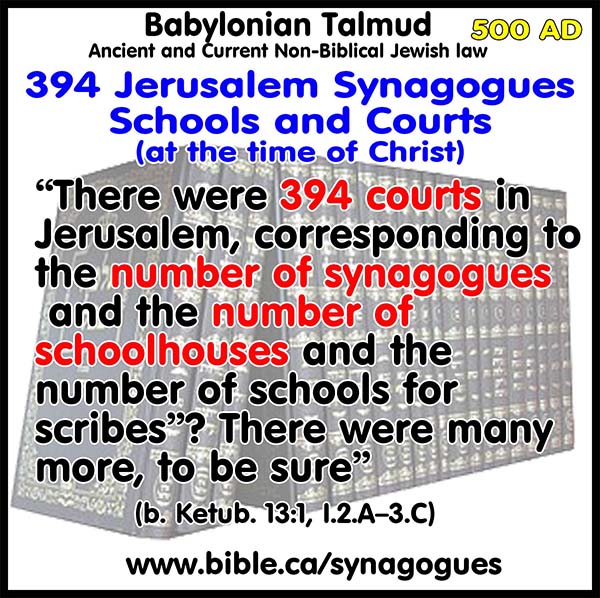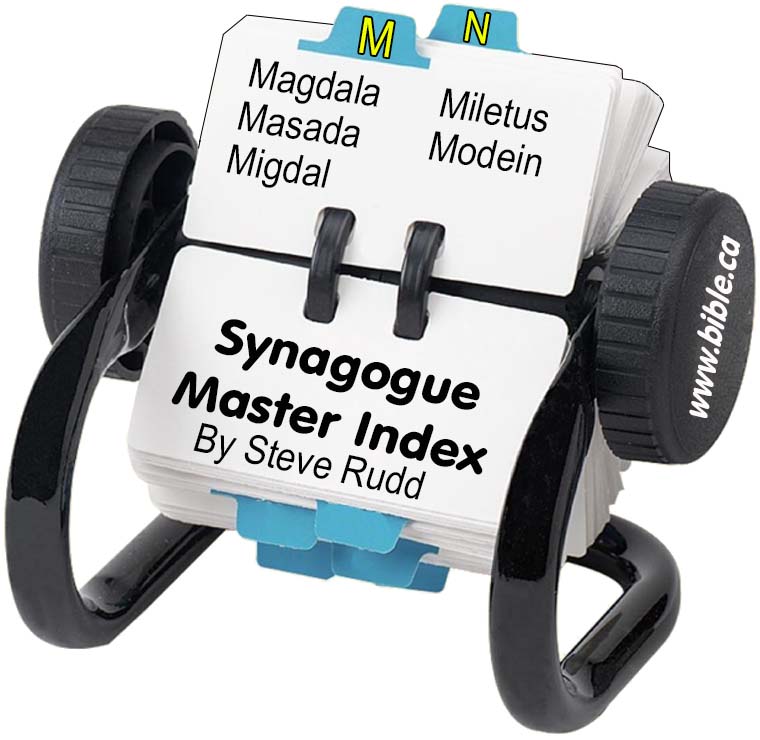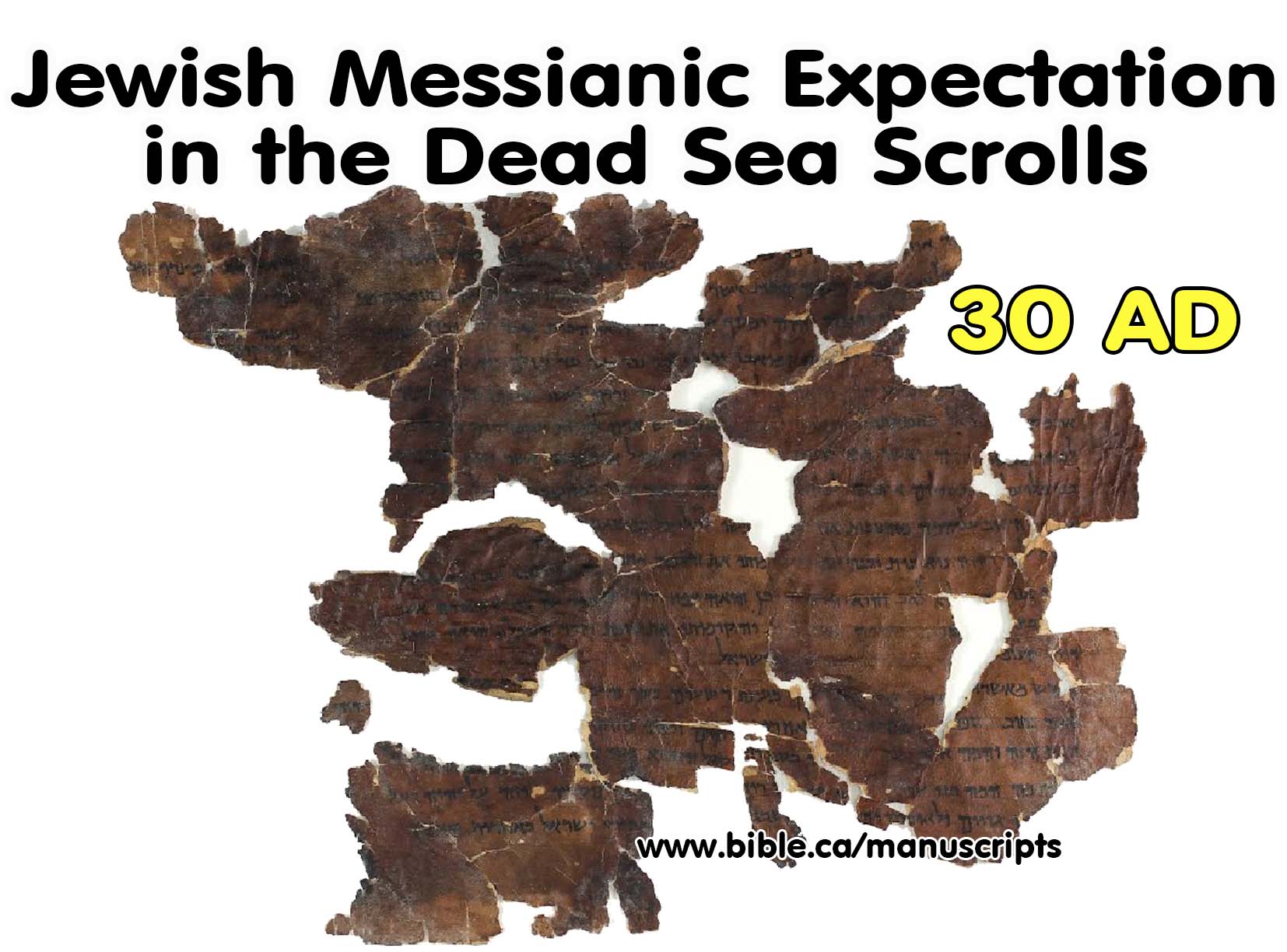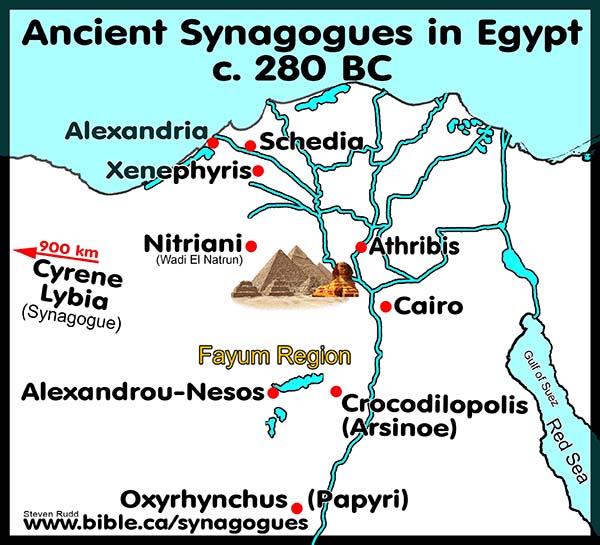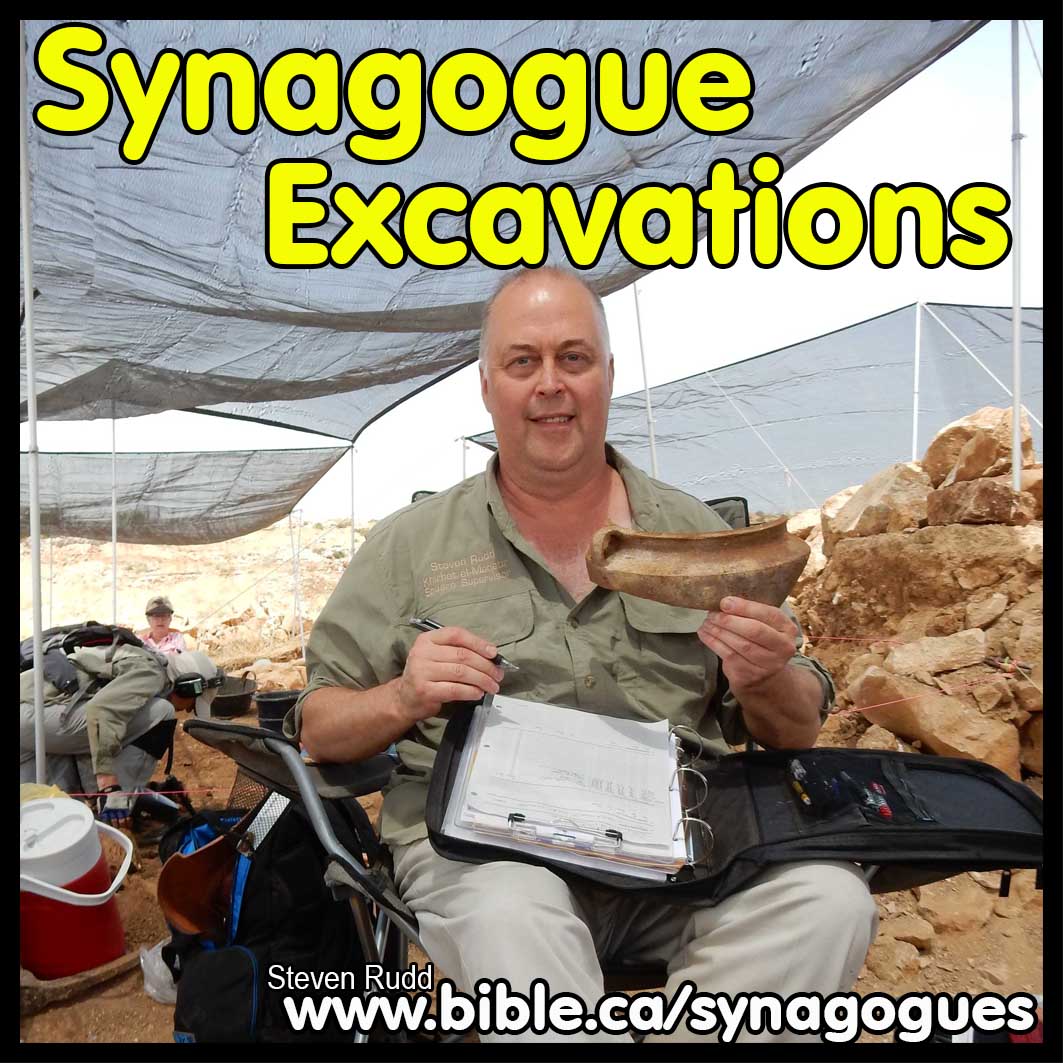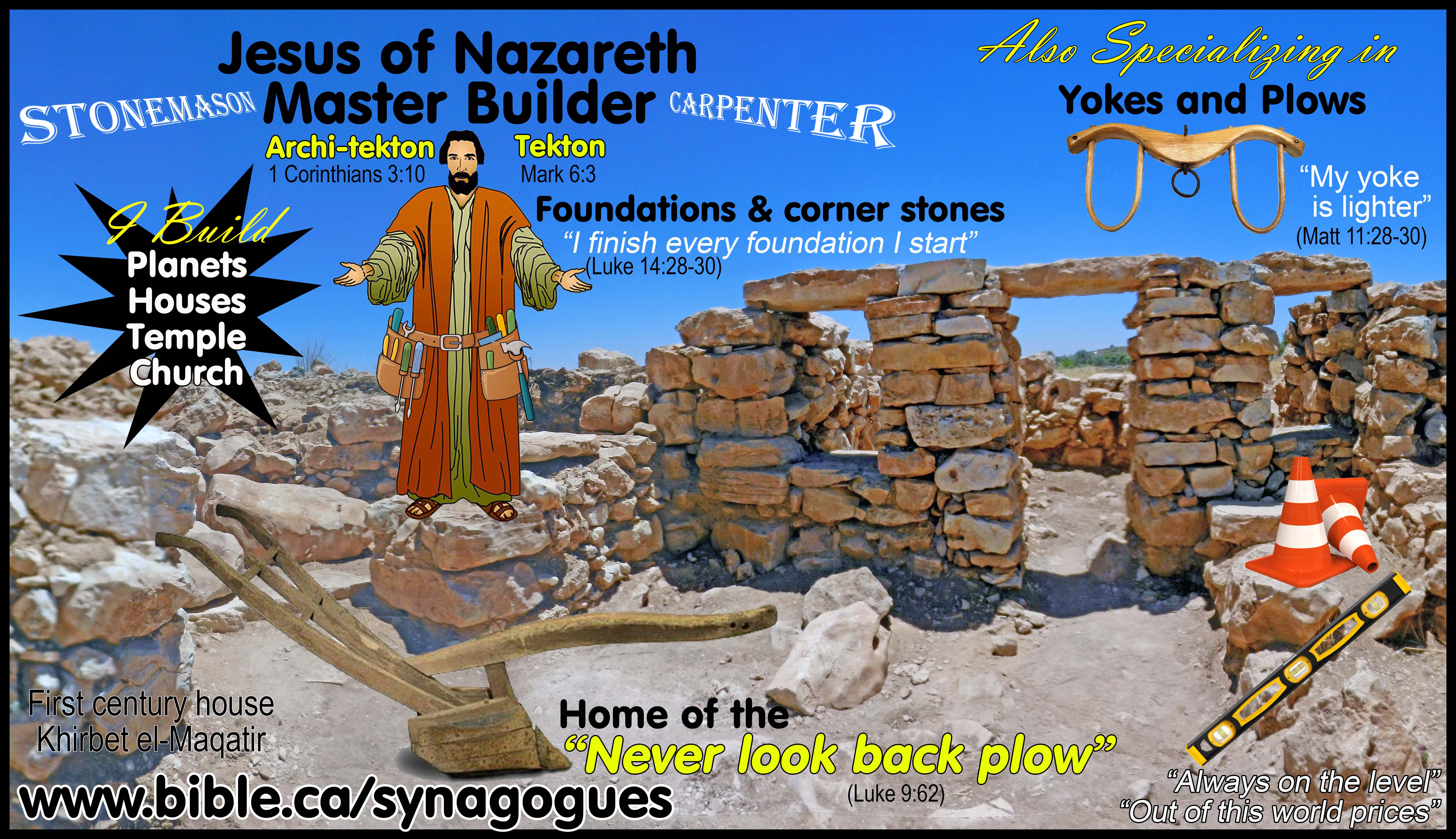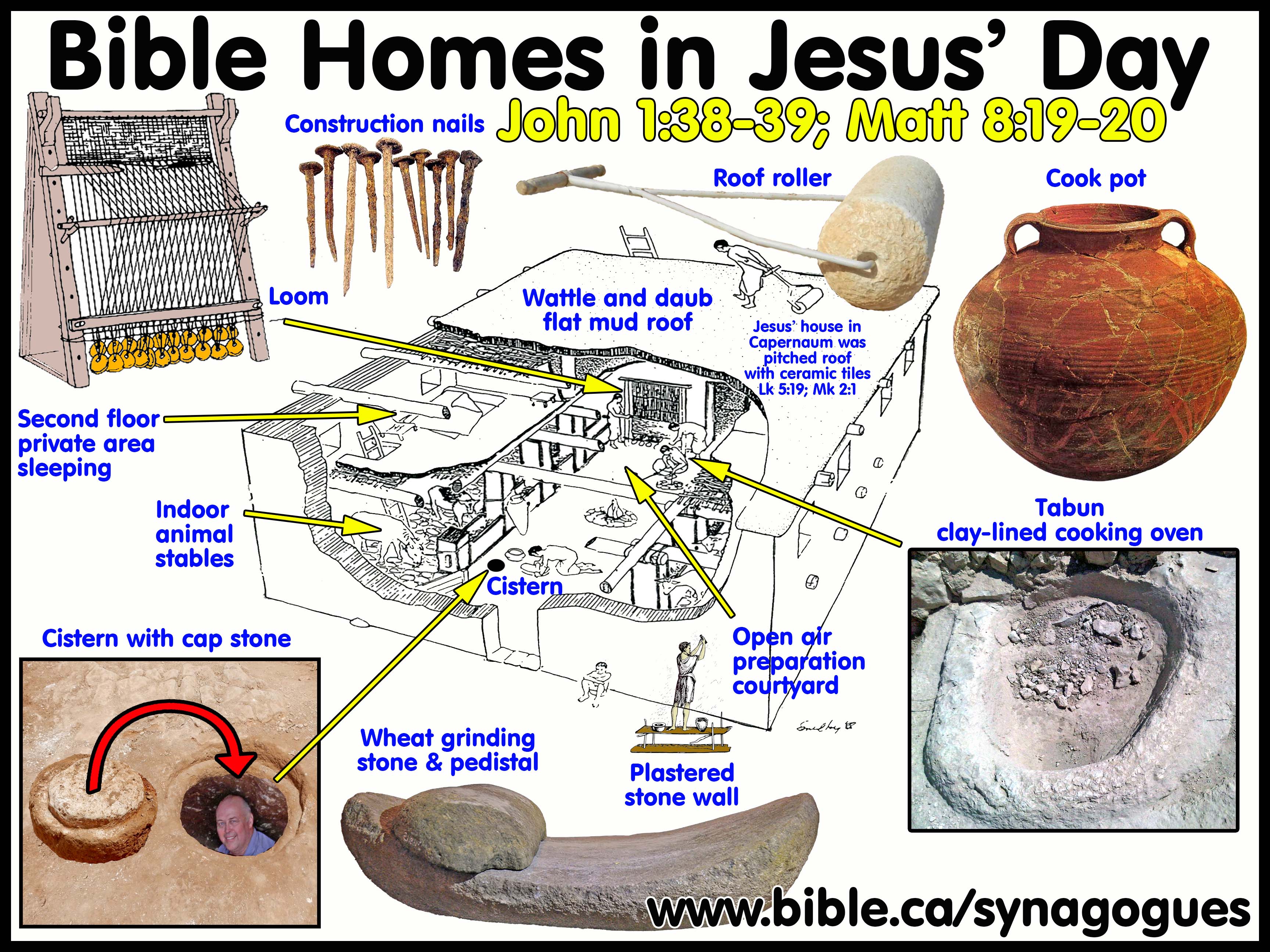24 New Testament Synagogues
Ancient Synagogue Literary Sources
Inspired, infallible
“God said it, I believe it, THAT SETTLES IT!”
50 AD
“For Moses from
ancient generations has in every city those who preach him,
since he is read in the synagogues every Sabbath.”" (Acts
15:21)
Introduction:
A. Synagogues of the New Testament with occupation dates of 50 AD or earlier:
1. The New Testament names 24 cities that had synagogues: (see alphabetic details below)
|
Antioch, Pisidia Acts 13:14–17 |
Jerusalem Acts 24:12, inscription, Talmud |
|
Antioch, Syria (Paul) Acts 6:5; Josephus W. 7.44 |
Laodicea Col 4:16; Cicero Flaccus 28 |
|
Athens Acts 17:16–17 |
Miletus Acts 20:17; Josephus Ant. 14.244 |
|
Berea Acts 17:10–14 |
Magdala Mark 5:21, Excavation |
|
Cana Jn 2:1; Jos. Life 86 |
Nazareth Luke 4:16-30 |
|
Capernaum John 6:59, Excavation |
Pergamum Rev 2:12; Cicero Flaccus 28 |
|
Corinth Acts 18:4–11 |
Philadelphia Revelation 3:7-13 |
|
Cyrene Mark 15:21; Inscription |
Philippi Acts 16:13 |
|
Damascus Acts 9:1–25 |
Salamis, Cypress Island Acts 13:4–5 |
|
Ephesus Acts 16:13; 18:19-19:20 |
Smyrna Revelation 2:8-10 |
|
Iconium, Pisidia Acts 14:1–7 |
Thessalonica Acts 17:1–9 |
|
Jericho Lk 19:1, Excavation |
Thyatira Acts 16:14; Rev 2:18 |
2. Region of Galilee: The New Testament makes 15 general references to synagogues in Galilee
3. Region of Judea: The New Testament makes 13 general references to synagogues in Judea
B. The experts are WRONG when say that synagogues didn’t exist before 70 AD (destruction of Jerusalem Temple)
1. These same experts are actually Bible scoffers and sceptics say that the new Testament is not a reliable record of history:
a. “New Testament accounts of activities in 'synagogues' do not necessarily reflect the historical reality of the time” (Ancient Synagogues - Archaeology and Art: New Discoveries and Current Research, Rachel Hachlili, p10, 2013 AD)
b. Some of these scholars are Jewish and therefore HATE the New Testament.
c. Other scholars are atheists or agnostic.
d. Their doubt and unbelief lurks in every conclusion they make.
e. Just imagine what better analysis these “no pre70 AD synagogue” would make if they BEGAN with the idea that synagogues were in full flower in 200 BC!
f. They wrongly feel that synagogues would have been viewed as directly competing with the Jerusalem temple.
g. Ignore key archeological and textual facts even though they are fully aware of them.
h. When synagogue looking structures are identified, they always interpret them as being civic non-religious centers for no reason other then their own personal bias and dogma that there were not synagogues before 70 AD.
2. They wrongly think synagogues BEGAN in Judea after 70 AD when in fact they began in 380 BC in Alexandria as a direct result of the Septuagint which was all according to God’s larger plan in transforming His people from Moasic temple worship to the New Testament church.
C. God’s eternal purpose in the Christian church:
“The manifold wisdom of God is now made known through the church to the rulers and the authorities in the heavenly places. This was in accordance with the eternal purpose which He carried out in Christ Jesus” (Eph 3:8-12)
1. The rise of Babylon, Persia, Greece and Rome were all part of God’s eternal purpose in the Christian church.
2. The mass conversion of the Jewish population to speak Greek was a providential part of God’s eternal purpose in the Christian church.
3. The Library of Alexandria, founded by Ptolemy I (323-282 BC) was a providential part of God’s eternal purpose in the Christian church.
4. The Greek Septuagint of the Torah by 70 Jewish bilingual scholars Jerusalem from in 280 BC, under the oversight of Ptolemy II in Egypt, was part of God’s eternal purpose in the Christian church to provide a “certified” translation of the entire Tanakh in Greek.
5. The Egyptian-origin Jewish Synagogues (proseuche- “place of prayer”) in 280 BC a part of God’s master plan for the Christian church in providing a transition from Temple to Church worship.
6. At the time of the church’s birth on 3 April 33 AD, Christians worshipped Christ in the Jerusalem Temple and in the hundreds of Jerusalem synagogues:
a. "Day by day continuing with one mind in the temple, and breaking bread from house to house, they were taking their meals together with gladness and sincerity of heart," (Acts 2:46)
b. Notice the reading and teaching was in the temple, but communion was done privately house to house.
7. Apostle Paul who wrote have the New Testament was a Pharisees, the very sect that controlled Synagogues (Sadducees/High priest controlled the Jerusalem temple). In this way apostle Paul’s own significant experience in a synagogue environment paved the way for his conversion to Christianity and establishing new local churches all over the world.
a. In 36 AD Apostle Paul (Saul) triggered the first great Christian Diaspora of with the stoning of Stephen: "Saul was in hearty agreement with putting him to death. And on that day a great persecution began against the church in Jerusalem, and they were all scattered throughout the regions of Judea and Samaria, except the apostles. Some devout men buried Stephen, and made loud lamentation over him. But Saul began ravaging the church, entering house after house, and dragging off men and women, he would put them in prison." (Acts 8:1-3)
b. During this early period, Christians began using Synagogues on the first day of the week, adopting the same basic pattern of synagogue worship they were familiar as Jews before converting to Jesus Christ as their risen savior from their sins.
c. After Paul’s conversion during his three missionary journeys, Paul began worshipping with the Jews in the synagogues until they expelled him.
8. Most first century Christian churches were populated from the “cream of the spiritual crop” of Jewish believers who faithfully worshipped God every Sabbath.
a. Generally, wherever there was a synagogue, there would also be a church:
b. The first century church was primarily composed of faithful honest Jews who saw Jesus as the messiah of Tanakh prophecy.
c. Here is a map of all the first century churches listed in the Bible.
9. There are hundreds of first century synagogues that existed and churches that were established that are not named in the Bible.
I. 24 Synagogues in the New Testament:
1. Antioch, Pisidia:
a. Bible passages:
i. "But going on from Perga, they arrived at Pisidian Antioch, and on the Sabbath day they went into the synagogue and sat down. After the reading of the Law and the Prophets the synagogue officials sent to them, saying, “Brethren, if you have any word of exhortation for the people, say it.” Paul stood up, and motioning with his hand said, “Men of Israel, and you who fear God, listen: “The God of this people Israel chose our fathers and made the people great during their stay in the land of Egypt, and with an uplifted arm He led them out from it." (Acts 13:14–17)
ii. "“And we preach to you the good news of the promise made to the fathers, that God has fulfilled this promise to our children in that He raised up Jesus, as it is also written in the second Psalm, ‘You are My Son; today i have begotten You.’ “As for the fact that He raised Him up from the dead, no longer to return to decay, He has spoken in this way: ‘I will give you the holy and sure blessings of David.’ “Therefore He also says in another Psalm, ‘You will not allow Your Holy One to undergo decay.’ “For David, after he had served the purpose of God in his own generation, fell asleep, and was laid among his fathers and underwent decay; but He whom God raised did not undergo decay. “Therefore let it be known to you, brethren, that through Him forgiveness of sins is proclaimed to you, and through Him everyone who believes is freed from all things, from which you could not be freed through the Law of Moses." (Acts 13:32–39)
iii. "As Paul and Barnabas were going out, the people kept begging that these things might be spoken to them the next Sabbath. Now when the meeting of the synagogue had broken up, many of the Jews and of the God-fearing proselytes followed Paul and Barnabas, who, speaking to them, were urging them to continue in the grace of God. The next Sabbath nearly the whole city assembled to hear the word of the Lord. But when the Jews saw the crowds, they were filled with jealousy and began contradicting the things spoken by Paul, and were blaspheming. Paul and Barnabas spoke out boldly and said, “It was necessary that the word of God be spoken to you first; since you repudiate it and judge yourselves unworthy of eternal life, behold, we are turning to the Gentiles. “For so the Lord has commanded us, ‘I have placed You as a light for the Gentiles, That You may bring salvation to the end of the earth.’ ” When the Gentiles heard this, they began rejoicing and glorifying the word of the Lord; and as many as had been appointed to eternal life believed. And the word of the Lord was being spread through the whole region. But the Jews incited the devout women of prominence and the leading men of the city, and instigated a persecution against Paul and Barnabas, and drove them out of their district. But they shook off the dust of their feet in protest against them and went to Iconium." (Acts 13:42–51)
2. Antioch, Syria: (Paul’s home base for missionary journeys)
a. Bible passages:
i. "The statement found approval with the whole congregation; and they chose Stephen, a man full of faith and of the Holy Spirit, and Philip, Prochorus, Nicanor, Timon, Parmenas and Nicolas, a proselyte from Antioch." (Acts 6:5)
ii. "So then those who were scattered because of the persecution that occurred in connection with Stephen made their way to Phoenicia and Cyprus and Antioch, speaking the word to no one except to Jews alone. But there were some of them, men of Cyprus and Cyrene, who came to Antioch and began speaking to the Greeks also, preaching the Lord Jesus. And the hand of the Lord was with them, and a large number who believed turned to the Lord. The news about them reached the ears of the church at Jerusalem, and they sent Barnabas off to Antioch. Then when he arrived and witnessed the grace of God, he rejoiced and began to encourage them all with resolute heart to remain true to the Lord; for he was a good man, and full of the Holy Spirit and of faith. And considerable numbers were brought to the Lord. And he left for Tarsus to look for Saul; and when he had found him, he brought him to Antioch. And for an entire year they met with the church and taught considerable numbers; and the disciples were first called Christians in Antioch. Now at this time some prophets came down from Jerusalem to Antioch. One of them named Agabus stood up and began to indicate by the Spirit that there would certainly be a great famine all over the world. And this took place in the reign of Claudius." (Acts 11:19–28)
iii. Peter’s hypocrisy: Peter at first sat at table and ate with the Gentile Christians, as Barnabas and the rest of the Jewish Christians in Antioch had been doing until some Jews arrived from out of town. This implies a synagogue existed in Antioch: "But when Cephas came to Antioch, I opposed him to his face, because he stood condemned. For prior to the coming of certain men from James, he used to eat with the Gentiles; but when they came, he began to withdraw and hold himself aloof, fearing the party of the circumcision. The rest of the Jews joined him in hypocrisy, with the result that even Barnabas was carried away by their hypocrisy. But when I saw that they were not straightforward about the truth of the gospel, I said to Cephas in the presence of all, “If you, being a Jew, live like the Gentiles and not like the Jews, how is it that you compel the Gentiles to live like Jews? “We are Jews by nature and not sinners from among the Gentiles; nevertheless knowing that a man is not justified by the works of the Law but through faith in Christ Jesus, even we have believed in Christ Jesus, so that we may be justified by faith in Christ and not by the works of the Law; since by the works of the Law no flesh will be justified. “But if, while seeking to be justified in Christ, we ourselves have also been found sinners, is Christ then a minister of sin? May it never be!" (Galatians 2:11–17)
b. Josephus: “for though Antiochus, who was called Epiphanes, laid Jerusalem waste and spoiled the temple, yet did those that succeeded him in the kingdom restore all the donations that were made of brass to the Jews of Antioch, and dedicated them to their synagogue [synagogue]; and granted them the enjoyment of equal privileges of citizens with the Greeks themselves; (45) and as the succeeding kings treated them after the same manner, they both multiplied to a great number, and adorned their temple gloriously by fine ornaments, and with great magnificence, in the use of what has been given them. They also made proselytes of a great many of the Greeks perpetually, and thereby, after sort, brought them to be a portion of their own body.” (Josephus, Wars of the Jews 7.44–45)
3. Athens:
a. Bible passages: "Now while Paul was waiting for them at Athens, his spirit was being provoked within him as he was observing the city full of idols. So he was reasoning in the synagogue with the Jews and the God-fearing Gentiles, and in the market place every day with those who happened to be present." (Acts 17:16–17)
4. Berea:
a. Bible passages: "The brethren immediately sent Paul and Silas away by night to Berea, and when they arrived, they went into the synagogue of the Jews. Now these were more noble-minded than those in Thessalonica, for they received the word with great eagerness, examining the Scriptures daily to see whether these things were so. Therefore many of them believed, along with a number of prominent Greek women and men. But when the Jews of Thessalonica found out that the word of God had been proclaimed by Paul in Berea also, they came there as well, agitating and stirring up the crowds. Then immediately the brethren sent Paul out to go as far as the sea; and Silas and Timothy remained there." (Acts 17:10–14)
5. Cana:
a. Bible passages:
i. Water into wine: 29 AD: Jn 2:1
ii. Healing of nobleman’s son: 29 AD: Jn 4:46
b. Josephus:
i. Josephus’ home town before the start of the first Jewish war: 66 AD: Jos. Life 86. From here he moved to Madgala (see below)
ii. Home town of Josephus: “Accordingly, I [Josephus] did not hinder him, as having no suspicion of any wicked designs of his; and I wrote to those to whom I had committed the administration of the affairs of Tiberias by name, that they should provide a lodging for John, and for such as should come with him, and should procure him what necessaries soever he should stand in need of. Now at this time my [Josephus] abode was in a village of Galilee, which is named Cana.” (Josephus, Life 86)
iii. Home town of Antigonus II: “Now as Antigonus [II, 40-37 BC] had a mind to appear to exceed Herod not only in the courage but in the number of his men, he sent Pappus, one of his companions, with an army against Samaria, (334) whose fortune it was to oppose Macheras. But Herod overran the enemies’ country, and demolished five little cities, and destroyed two thousand men that were in them; and burned their houses, and then returned to his camp; but his headquarters were at the village called Cana.” (Josephus, Wars 1.333-334, 40-37 BC)
c.
Archeological Excavated top plan: Cana
30 AD
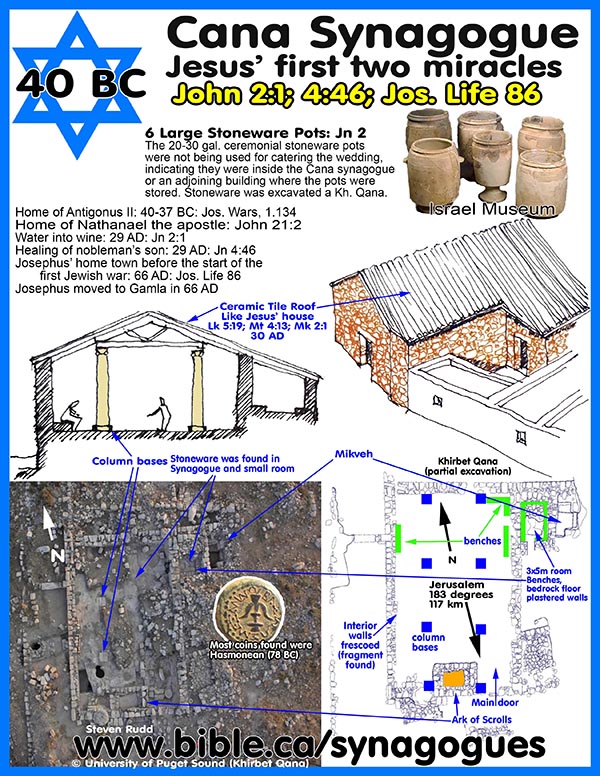
6. Capernaum:
a. Bible passages:
i. Jesus’ house: Lk 5:19; Mt 4:13; Mk 2:1; 9:33
ii. Unclean spirit cast out of Man: Mk 1:21-28; Lk 4:31-38 (Notice news of healing spread throughout the Galilee region)
iii. Healing of Centurion’s paralyzed servant: Mt 8:5-13; Lk 7:1-10 (notice He had “built our synagogue” and the Jews interceded)
iv. Inside Synagogue: Jesus is Manna that came out of heaven: John 6:24-71
v. Paralytic healed at Jesus’ house: Mk 2:1-13
vi. Call of Matthew, dinner in Matthew’s house: 2:14-22
vii. Disciples discuss who is the greatest: Mark 9:33
viii. Jesus walks on water and “beam me up Scotty” ends up on the shore of Capernaum: John 6:17
ix. Peter’s mother-in-law healed in his house: Matt 8:14-16: Mark 1:29-34; Luke 4:38-41
b.
Archeological Excavation top plan: Details Capernaum
30 AD.
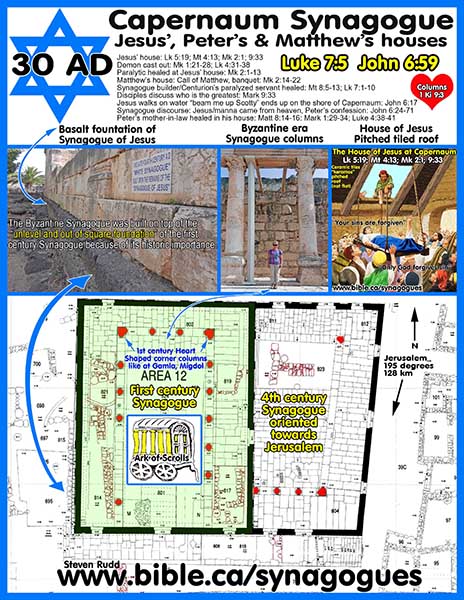
7. Corinth:
a. Bible passages:
i. The one synagogue official was converted but the second was not and was beaten by his fellow unbelieving Jews when their effort to bring civil charges against Paul failed.
ii. "And he was reasoning in the synagogue every Sabbath and trying to persuade Jews and Greeks. But when Silas and Timothy came down from Macedonia, Paul began devoting himself completely to the word, solemnly testifying to the Jews that Jesus was the Christ. But when they resisted and blasphemed, he shook out his garments and said to them, “Your blood be on your own heads! I am clean. From now on I will go to the Gentiles.” Then he left there and went to the house of a man named Titius Justus, a worshiper of God, whose house was next to the synagogue. Crispus, the leader of the synagogue, believed in the Lord with all his household, and many of the Corinthians when they heard were believing and being baptized. And the Lord said to Paul in the night by a vision, “Do not be afraid any longer, but go on speaking and do not be silent; for I am with you, and no man will attack you in order to harm you, for I have many people in this city.” And he settled there a year and six months, teaching the word of God among them." (Acts 18:4–11)
iii. "And they all took hold of Sosthenes, the leader of the synagogue, and began beating him in front of the judgment seat. But Gallio was not concerned about any of these things. Paul, having remained many days longer, took leave of the brethren and put out to sea for Syria, and with him were Priscilla and Aquila. In Cenchrea he had his hair cut, for he was keeping a vow." (Acts 18:17–18)
8. Cyrene, Libya:
a. Bible passages:
i. "They pressed into service a passer-by coming from the country, Simon of Cyrene (the father of Alexander and Rufus), to bear His cross." (Mark 15:21)
ii. "When they led Him away, they seized a man, Simon of Cyrene, coming in from the country, and placed on him the cross to carry behind Jesus." (Luke 23:26)
iii. "Phrygia and Pamphylia, Egypt and the districts of Libya around Cyrene, and visitors from Rome, both Jews and proselytes," (Acts 2:10)
iv. "But there were some of them, men of Cyprus and Cyrene, who came to Antioch and began speaking to the Greeks also, preaching the Lord Jesus." (Acts 11:20)
v. "Now there were at Antioch, in the church that was there, prophets and teachers: Barnabas, and Simeon who was called Niger, and Lucius of Cyrene, and Manaen who had been brought up with Herod the tetrarch, and Saul." (Acts 13:1)
b. Archeological Inscription:
i. A partial six line inscription from Cyrene dating from 25 BC uses the word “synagogue”: “… and Decimus Sa- … of Sosandros … of Teimarchos … and Leonides, … Ti- … (the) synagogue (or congregation) [synagoge] …”
ii. “This fragment is preserved from the upper part of a stele whose top was inscribed with a leaf and plant-tendril motif. Although its Jewish provenance is uncertain, Applebaum notes that the form of the stele resembles the two earlier inscriptions from Berenice (cuz 70-71; Nos. 131 and 132). More compelling in this regard, however, is the presence of the partially restored term synagoge, which may have referenced a local Jewish congregation or its civic center, as in the previous example from Berenice. Nevertheless, the highly fragmentary condition of the monument prevents the drawing of any firm conclusions. (The Ancient Synagogue from its Origins to 200 AD, Anders Runesson, p170, 2008 AD)
9. Damascus:
a. Bible passages:
i. "Now Saul, still breathing threats and murder against the disciples of the Lord, went to the high priest, and asked for letters from him to the synagogues at Damascus, so that if he found any belonging to the Way, both men and women, he might bring them bound to Jerusalem." (Acts 9:1–2)
ii. "and he took food and was strengthened. Now for several days he was with the disciples who were at Damascus, and immediately he began to proclaim Jesus in the synagogues, saying, “He is the Son of God.” All those hearing him continued to be amazed, and were saying, “Is this not he who in Jerusalem destroyed those who called on this name, and who had come here for the purpose of bringing them bound before the chief priests?” But Saul kept increasing in strength and confounding the Jews who lived at Damascus by proving that this Jesus is the Christ. When many days had elapsed, the Jews plotted together to do away with him, but their plot became known to Saul. They were also watching the gates day and night so that they might put him to death; but his disciples took him by night and let him down through an opening in the wall, lowering him in a large basket." (Acts 9:19–25)
10. Ephesus: Acts 18:19-19:20
a. Bible passages:
i. And on the Sabbath day we went outside the gate to a riverside, where we were supposing that there would be a place of prayer [synagogue]; and we sat down and began speaking to the women who had assembled." (Acts 16:13)
ii. First missionary journey: "They came to Ephesus, and he left them there. Now he himself entered the synagogue and reasoned with the Jews. When they asked him to stay for a longer time, he did not consent, but taking leave of them and saying, “I will return to you again if God wills,” he set sail from Ephesus." (Acts 18:19–21)
iii. Second missionary journey: "Now a Jew named Apollos, an Alexandrian by birth, an eloquent man, came to Ephesus; and he was mighty in the Scriptures. This man had been instructed in the way of the Lord; and being fervent in spirit, he was speaking and teaching accurately the things concerning Jesus, being acquainted only with the baptism of John; and he began to speak out boldly in the synagogue. But when Priscilla and Aquila heard him, they took him aside and explained to him the way of God more accurately. And when he wanted to go across to Achaia, the brethren encouraged him and wrote to the disciples to welcome him; and when he had arrived, he greatly helped those who had believed through grace, for he powerfully refuted the Jews in public, demonstrating by the Scriptures that Jesus was the Christ." (Acts 18:24–28)
iv. Second missionary journey: "And he entered the synagogue and continued speaking out boldly for three months, reasoning and persuading them about the kingdom of God. But when some were becoming hardened and disobedient, speaking evil of the Way before the people, he withdrew from them and took away the disciples, reasoning daily in the school of Tyrannus. This took place for two years, so that all who lived in Asia heard the word of the Lord, both Jews and Greeks." (Acts 19:8–10)
b. Philo of Alexandria:
i. “Caius Norbanus Flaccus, proconsul, to the governors of the Ephesians, greeting. “’Caesar has written word to me, that the Jews, wherever they are, are accustomed to assemble [greek: synago] together, in compliance with a peculiar ancient custom of their nation, to contribute money which they send to Jerusalem; and he does not choose that they should have any hindrance offered to them, to prevent them from doing this; therefore I have written to you, that you may know that I command that they shall be allowed to do these things.’” (Philo, Embassy 315)
c. Josephus:
i. “When Artemon was prytanis, on the first day of the month Leneon, Dolabella imperator, to the senate and magistrates, and people of the Ephesians, sendeth greeting. (226) Alexander, the son of Theodorus, the ambassador of Hyrcanus, the son of Alexander the high priest and ethnarch of the Jews, appeared before me, to show that his countrymen could not go into their armies, because they are not allowed to bear arms, or to travel on the Sabbath days, nor there to procure themselves those sorts of food which they have been used to eat from the times of their forefathers,—(227) I do therefore grant them a freedom from going into the army, as the former prefects have done, and permit them to use the customs of their forefathers, in assembling together for sacred and religious purposes, as their law requires, and for collecting oblations necessary for sacrifices; and my will is, that you write this to the several cities under your jurisdiction.” 13. (228) And these were the concessions that Dolabella made to our nation when Hyrcanus sent an embassage to him; but Lucius the consul’s decree ran thus:—“I have at my tribunal set these Jews, who are citizens of Rome, and follow the Jewish religious rites, and yet live at Ephesus, free from going into the army, on account of the superstition they are under.” (Josephus Antiquities 14.225–228, decree: 43 BC)
11. Iconium, Pisidia:
a. Bible passages:
i. "In Iconium they entered the synagogue of the Jews together, and spoke in such a manner that a large number of people believed, both of Jews and of Greeks. But the Jews who disbelieved stirred up the minds of the Gentiles and embittered them against the brethren. Therefore they spent a long time there speaking boldly with reliance upon the Lord, who was testifying to the word of His grace, granting that signs and wonders be done by their hands. But the people of the city were divided; and some sided with the Jews, and some with the apostles. And when an attempt was made by both the Gentiles and the Jews with their rulers, to mistreat and to stone them, they became aware of it and fled to the cities of Lycaonia, Lystra and Derbe, and the surrounding region; and there they continued to preach the gospel." (Acts 14:1–7)
12. Jericho:
a. Bible passages:
i. Jesus must have visited the synagogue often: Lk 19:1; Mk 10:46-52; Lk 18:35-43; Mt 20:29-34.
ii. Good Samaritan: Luke 19:1-10 "Jesus replied and said, “A man was going down from Jerusalem to Jericho, and fell among robbers, and they stripped him and beat him, and went away leaving him half dead." (Luke 10:30)
iii. Bartimaeus: "Now they came to Jericho. As He went out of Jericho with His disciples and a great multitude, blind Bartimaeus, the son of Timaeus, sat by the road begging. And when he heard that it was Jesus of Nazareth, he began to cry out and say, “Jesus, Son of David, have mercy on me!” Then many warned him to be quiet; but he cried out all the more, “Son of David, have mercy on me!” So Jesus stood still and commanded him to be called. Then they called the blind man, saying to him, “Be of good cheer. Rise, He is calling you.” And throwing aside his garment, he rose and came to Jesus. So Jesus answered and said to him, “What do you want Me to do for you?” The blind man said to Him, “Rabboni, that I may receive my sight.” Then Jesus said to him, “Go your way; your faith has made you well.” And immediately he received his sight and followed Jesus on the road." (Mark 10:46–52)
iv. Two bind men healed: "Now as they went out of Jericho, a great multitude followed Him. And behold, two blind men sitting by the road, when they heard that Jesus was passing by, cried out, saying, “Have mercy on us, O Lord, Son of David!” Then the multitude warned them that they should be quiet; but they cried out all the more, saying, “Have mercy on us, O Lord, Son of David!” So Jesus stood still and called them, and said, “What do you want Me to do for you?” They said to Him, “Lord, that our eyes may be opened.” So Jesus had compassion and touched their eyes. And immediately their eyes received sight, and they followed Him." (Matthew 20:29–34)
v. Blind man: "Then it happened, as He was coming near Jericho, that a certain blind man sat by the road begging. And hearing a multitude passing by, he asked what it meant. So they told him that Jesus of Nazareth was passing by. And he cried out, saying, “Jesus, Son of David, have mercy on me!” Then those who went before warned him that he should be quiet; but he cried out all the more, “Son of David, have mercy on me!” So Jesus stood still and commanded him to be brought to Him. And when he had come near, He asked him, saying, “What do you want Me to do for you?” He said, “Lord, that I may receive my sight.” Then Jesus said to him, “Receive your sight; your faith has made you well.” And immediately he received his sight, and followed Him, glorifying God. And all the people, when they saw it, gave praise to God." (Luke 18:35–43)
vi. Zaccheus, Tax collector: "He entered Jericho and was passing through. And there was a man called by the name of Zaccheus; he was a chief tax collector and he was rich. Zaccheus was trying to see who Jesus was, and was unable because of the crowd, for he was small in stature. So he ran on ahead and climbed up into a sycamore tree in order to see Him, for He was about to pass through that way. When Jesus came to the place, He looked up and said to him, “Zaccheus, hurry and come down, for today I must stay at your house.” And he hurried and came down and received Him gladly. When they saw it, they all began to grumble, saying, “He has gone to be the guest of a man who is a sinner.” Zaccheus stopped and said to the Lord, “Behold, Lord, half of my possessions I will give to the poor, and if I have defrauded anyone of anything, I will give back four times as much.” And Jesus said to him, “Today salvation has come to this house, because he, too, is a son of Abraham. “For the Son of Man has come to seek and to save that which was lost.”" (Luke 19:1–10)
b. Josephus:
i. Josephus describes Jericho at the time of Jesus: Wars 4.459
ii. Josephus describes Archelaus rebuilding Herod’s Palace at Jericho: Antiquities 17.340
c.
Archeological Excavation top plan: Jericho
75 BC
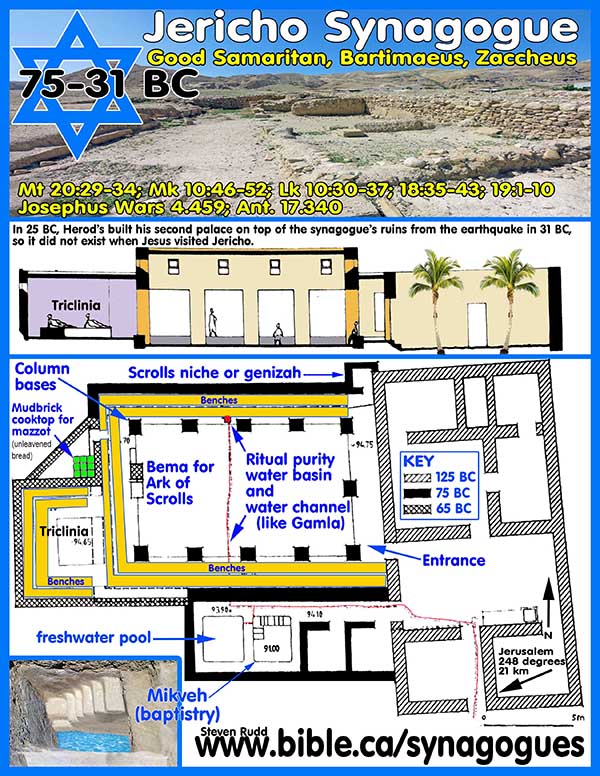
13. Jerusalem:
a. Bible passages:
i. "His parents said this because they were afraid of the Jews; for the Jews had already agreed that anyone who confessed Jesus to be the Messiah would be put out of the synagogue [gr: aposynagogus]. Therefore his parents said, “He is of age; ask him.”" (John 9:22–23)
ii. "Nevertheless many, even of the authorities, believed in him. But because of the Pharisees they did not confess it, for fear that they would be put out of the synagogue [gr: aposynagogus]; for they loved human glory more than the glory that comes from God." (John 12:42–43)
iii. "They will put you out of the synagogues [gr: aposynagogus]. Indeed, an hour is coming when those who kill you will think that by doing so they are offering worship to God. And they will do this because they have not known the Father or me." (John 16:2–3)
iv. "Then some of those who belonged to the synagogue [gr: synagoge]. of the Freedmen (as it was called), Cyrenians, Alexandrians, and others of those from Cilicia and Asia, stood up and argued with Stephen. But they could not withstand the wisdom and the Spirit with which he spoke." (Acts 6:9–10)
v. "They did not find me disputing with anyone in the temple or stirring up a crowd either in the synagogues [gr: synagogai – plural: many in Jerusalem] or throughout the city." (Acts 24:12)
vi. "“Indeed, I myself was convinced that I ought to do many things against the name of Jesusfg of Nazareth. And that is what I did in Jerusalem; with authority received from the chief priests, I not only locked up many of the saints in prison, but I also cast my vote against them when they were being condemned to death. By punishing them often in all the synagogues [gr: synagogai – plural: many in Jerusalem] I tried to force them to blaspheme; and since I was so furiously enraged at them, I pursued them even to foreign cities." (Acts 26:9–11)
b. Jerusalem Talmud: 400 AD
i. Details: Jerusalem Talmud 400 AD
ii. “‘The house of the Lord’ refers to the Temple. ‘And the king’s house’ refers to the palace of Zedekiah. ‘And all the houses of Jerusalem’ refers to the 480 synagogues that were in Jerusalem. For R. Phineas in the name of R. Hoshaiah: “There were 480 synagogues in Jerusalem and every one of them had a schoolhouse and a house for learning, a schoolhouse for Scripture and a house of learning for Mishnah.” (Jerusalem Talmud, y. Meg. 3:1, II.2.D–E)
c. Babylonian Talmud: 500 AD.
i. Details: Babylonian Talmud 500 AD
ii. “Three judges of civil law were in Jerusalem, Admon, Hanan, and Nahum. Said R. Pappa, “Who is the Tannaite authority who repeats, ‘Nahum’? It is R. Nathan, in accord with that which has been taught on Tannaite authority: R. Nathan says, ‘Also Nahum the Mede was among those who make decrees in Jerusalem,’ but sages did not concur with him.” And were there no others? Didn’t R. Phineas say R. Oshayya said, “There were three hundred ninety-four courts in Jerusalem, corresponding to the number of synagogues and the number of schoolhouses and the number of schools for scribes”? There were many more, to be sure, but we make reference in particular to judges of civil law. Said R. Judah said R. Assi, “The civil judges who were in Jerusalem would collect their salary of ninety-nine maneh from Temple funds. If they didn’t find that suitable, they would add to the salary.” “If they didn’t find that suitable”? So are we dealing with money grubbers? Rather: “If they didn’t find that sufficient,” they would give them more, even though they didn’t want it.” (Babylonian Talmud, b. Ketub. 13:1, I.2.A–3.C)
d. Archeological Inscription:
i. Theodostos
synagogue inscription dated to 18 BC
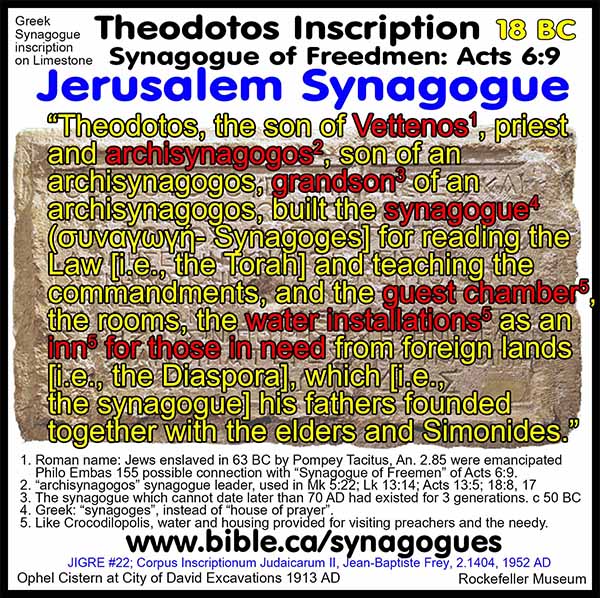
14. Laodicea:
a. Bible passages:
i. "When this letter is read among you, have it also read in the church of the Laodiceans; and you, for your part read my letter that is coming from Laodicea." (Colossians 4:16)
ii. "“To the angel of the church in Laodicea write: The Amen, the faithful and true Witness, the Beginning of the creation of God, says this: ‘I know your deeds, that you are neither cold nor hot; I wish that you were cold or hot. ‘So because you are lukewarm, and neither hot nor cold, I will spit you out of My mouth. ‘Because you say, “I am rich, and have become wealthy, and have need of nothing,” and you do not know that you are wretched and miserable and poor and blind and naked," (Revelation 3:14–17)
b. Josephus:
i. “The magistrates of the Laodiceans to Caius Rubilius, the son of Caius, the consul sendeth greeting. Sopater, the ambassador of Hyrcanus the high priest, hath delivered us an epistle from thee, whereby he lets us know that certain ambassadors were come from Hyrcanus, the high priest of the Jews, and brought an epistle written concerning their nation, (242) wherein they desire that the Jews may be allowed to observe their Sabbaths and other sacred rites, according to the laws of their forefathers, and that they may be under no command, because they are our friends and confederates: and that nobody may injure them in our provinces. Now although the Trallians there present contradicted them, and were not pleased with these decrees, yet didst thou give order that they should be observed, and informed us that thou hadst been desired to write this to us about them.” (Josephus, Antiquities 14.241–242)
c. Cicero:
i. “The next thing is that charge [stealing] about the Jewish gold. … As gold, under pretence of being given to the Jews, was accustomed every year to be exported out of Italy and all the provinces to Jerusalem, Flaccus issued an edict establishing a law that it should not be lawful for gold to be exported out of Asia. … There was a hundredweight of gold, more or less openly seized at Apamea, and weighed out in the forum at the feet of the praetor, by Sextus Caesius, a Roman knight, a most excellent and upright man; twenty pounds weight or a little more were seized at Laodicea, by Lucius Peducaeus, who is here in court, one of our judges; some was seized also at Adramyttium, by Cnaeus Domitius, the lieutenant, and a small quantity at Pergamus.” (Marcus Tullius Cicero, 106-54 BC, For Flaccus 28, Speech of M. T. Cicero in defence of Lucius Valerius Flaccus, 59 BC)
15. Magdala: Home of Mary Magdalene
a. Bible passages:
i. Home of Mary Magdalene: First to proclaim Gospel: Lk 8:2; Mt 28:1; Jn 20:18
1. "and also some women who had been healed of evil spirits and sicknesses: Mary who was called Magdalene, from whom seven demons had gone out," (Luke 8:2)
2. "Now after the Sabbath, as it began to dawn toward the first day of the week, Mary Magdalene and the other Mary came to look at the grave." (Matthew 28:1)
3. "Mary Magdalene came, announcing to the disciples, “I have seen the Lord,” and that He had said these things to her." (John 20:18)
ii. Home of Jairus the synagogue official whose daughter was raised from dead: “Talitha kumi” & healing: "When Jesus had crossed over again in the boat to the other side, a large crowd gathered around Him; and so He stayed by the seashore. One of the synagogue officials named Jairus came up, and on seeing Him, fell at His feet and implored Him earnestly, saying, “My little daughter is at the point of death; please come and lay Your hands on her, so that she will get well and live.” And He went off with him; and a large crowd was following Him and pressing in on Him. A woman who had had a hemorrhage for twelve years, and had endured much at the hands of many physicians, and had spent all that she had and was not helped at all, but rather had grown worse— after hearing about Jesus, she came up in the crowd behind Him and touched His cloak. For she thought, “If I just touch His garments, I will get well.” Immediately the flow of her blood was dried up; and she felt in her body that she was healed of her affliction. Immediately Jesus, perceiving in Himself that the power proceeding from Him had gone forth, turned around in the crowd and said, “Who touched My garments?” And His disciples said to Him, “You see the crowd pressing in on You, and You say, ‘Who touched Me?’ ” And He looked around to see the woman who had done this. But the woman fearing and trembling, aware of what had happened to her, came and fell down before Him and told Him the whole truth. And He said to her, “Daughter, your faith has made you well; go in peace and be healed of your affliction.” While He was still speaking, they came from the house of the synagogue official, saying, “Your daughter has died; why trouble the Teacher anymore?” But Jesus, overhearing what was being spoken, said to the synagogue official, “Do not be afraid any longer, only believe.” And He allowed no one to accompany Him, except Peter and James and John the brother of James. They came to the house of the synagogue official; and He saw a commotion, and people loudly weeping and wailing. And entering in, He said to them, “Why make a commotion and weep? The child has not died, but is asleep.” They began laughing at Him. But putting them all out, He took along the child’s father and mother and His own companions, and entered the room where the child was. Taking the child by the hand, He said to her, “Talitha kum!” (which translated means, “Little girl, I say to you, get up!”). Immediately the girl got up and began to walk, for she was twelve years old. And immediately they were completely astounded. And He gave them strict orders that no one should know about this, and He said that something should be given her to eat." (Mark 5:21–43)
b. Hemorrhaging woman healed: Mark 5:24–34 (see above)
c. Home base of Josephus during first Jewish war: 66 AD
i. “But as for the inhabitants of the city of Tiberias, they wrote to the king, and desired him to send them forces sufficient to be a guard to their country; for that they were desirous to come over to him. This was what they wrote to him; (156) but when I came to them, they desired me to build their walls, as I had promised them to do; for they had heard that the walls of Taricheae were already built. I agreed to their proposal accordingly; and when I had made preparation for the entire building, I gave order to the architects to go to work; (157) but on the third day, when I was gone to Taricheae, which was thirty furlongs distant from Tiberias, it so fell out, that some Roman horsemen were discovered on their march, not far from the city, which made it to be supposed that the forces were come from the king; (158) upon which they shouted, and lifted up their voices in commendations of the king, and in reproaches against me. Hereupon one came running to me, and told me what their dispositions were; and that they had resolved to revolt from me:—(159) upon hearing which news I was very much alarmed; for I had already sent away my armed men from Taricheae to their own homes, because the next day was our Sabbath; for I would not have the people of Taricheae disturbed [on that day] by a multitude of soldiers; (160) and indeed, whenever I sojourned at that city, I never took any particular care for a guard about my own body, because I had had frequent instances of the fidelity its inhabitants bore to me. (161) I had now about me no more than seven armed men, besides some friends, and was doubtful what to do; for to send to recall my own forces I did not think proper, because the present day was almost over: and had those forces been with me, I could not take up arms on the next day, because our laws forbade us so to do, even though our necessity should be very great; (162) and if I should permit the people of Taricheae and the strangers with them, to guard the city, I saw that they would not be sufficient for that purpose, and I perceived that I should be obliged to delay my assistance a great while; for I thought with myself that the forces that came from the king would prevent me, and that I should be driven out of the city. (163) I considered, therefore, how to get clear of these forces by a stratagem; so I immediately placed those my friends of Taricheae, on whom I could best confide, at the gates, to watch those very carefully who went out at those gates; I also called to me the heads of families, and bade every one of them to seize upon a ship, to go on board it, and to take a master with them, and follow him to the city of Tiberias. (164) I also myself went on board one of those ships, with my friends, and the seven armed men already mentioned, and sailed for Tiberias.” (Josephus Life 155-164)
d.
Archeological excavated top plan: Details: Magdala
50 BC
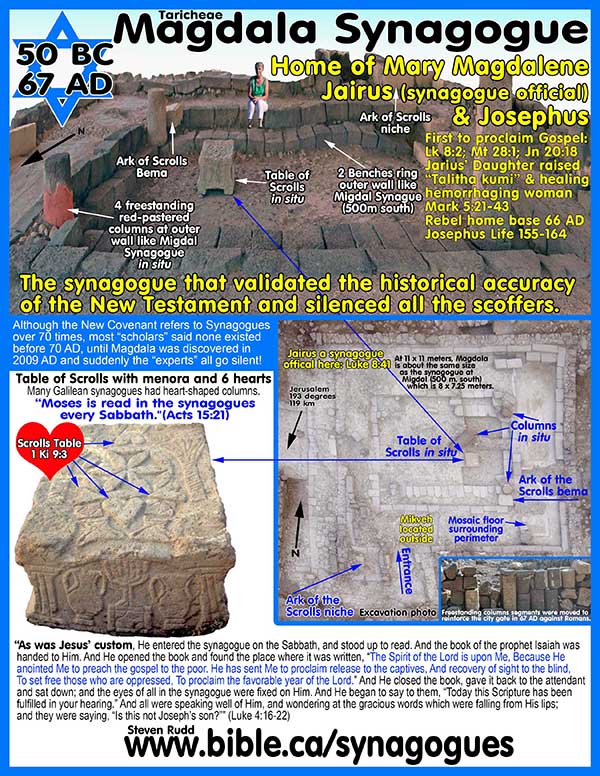
16. Miletus:
a. Bible verses as evidence of a synagogue:
i. "Sailing from there, we arrived the following day opposite Chios; and the next day we crossed over to Samos; and the day following we came to Miletus. For Paul had decided to sail past Ephesus so that he would not have to spend time in Asia; for he was hurrying to be in Jerusalem, if possible, on the day of Pentecost. From Miletus he sent to Ephesus and called to him the elders of the church." (Acts 20:15–17)
ii. "Erastus remained at Corinth, but Trophimus I left sick at Miletus." (2 Timothy 4:20)
b. Josephus:
i. “Publius Servilius, the son of Publius, of the Galban tribe, the proconsul, to the magistrates, senate, and people of the Milesians, sendeth greeting. (245) Prytanes, the son of Hermes, a citizen of yours, came to me when I was at Tralles, and held a court there, and informed me that you used the Jews in a way different from my opinion, and forbade them to celebrate their Sabbaths, and to perform the sacred rites received from their forefathers, and to manage the fruits of the earth according to their ancient custom; and that he had himself been the promulger of your decree, according as your laws require; (246) I would therefore have you know, that upon hearing the pleading on both sides, I gave sentence that the Jews should not be prohibited to make use of their own customs.” (Josephus Antiquities 14.244–246, decree: 46 BC)
17. Nazareth:
a. Bible Passages: Mk 6:1-6; Mt 13:53-58; Lk 4:16-30
i. "He left that place and came to his hometown, and his disciples followed him. On the sabbath he began to teach in the synagogue, and many who heard him were astounded. They said, “Where did this man get all this? What is this wisdom that has been given to him? What deeds of power are being done by his hands! Is not this the carpenter, the son of Mary and brother of James and Joses and Judas and Simon, and are not his sisters here with us?” And they took offense at him. Then Jesus said to them, “Prophets are not without honor, except in their hometown, and among their own kin, and in their own house.” And he could do no deed of power there, except that he laid his hands on a few sick people and cured them. And he was amazed at their unbelief. Then he went about among the villages teaching." (Mark 6:1–6)
ii. "When Jesus had finished these parables, he left that place. He came to his hometown and began to teach the people in their synagogue, so that they were astounded and said, “Where did this man get this wisdom and these deeds of power? Is not this the carpenter’s son? Is not his mother called Mary? And are not his brothers James and Joseph and Simon and Judas? And are not all his sisters with us? Where then did this man get all this?” And they took offense at him. But Jesus said to them, “Prophets are not without honor except in their own country and in their own house.” And he did not do many deeds of power there, because of their unbelief." (Matthew 13:53–58)
iii. "When he came to Nazareth, where he had been brought up, he went to the synagogue on the sabbath day, as was his custom. He stood up to read, and the scroll of the prophet Isaiah was given to him. He unrolled the scroll and found the place where it was written: “The Spirit of the Lord is upon me, because he has anointed me to bring good news to the poor. He has sent me to proclaim release to the captives and recovery of sight to the blind, to let the oppressed go free, to proclaim the year of the Lord’s favor.” And he rolled up the scroll, gave it back to the attendant, and sat down. The eyes of all in the synagogue were fixed on him. Then he began to say to them, “Today this scripture has been fulfilled in your hearing.” All spoke well of him and were amazed at the gracious words that came from his mouth. They said, “Is not this Joseph’s son?” He said to them, “Doubtless you will quote to me this proverb, ‘Doctor, cure yourself!’ And you will say, ‘Do here also in your hometown the things that we have heard you did at Capernaum.’ ” And he said, “Truly I tell you, no prophet is accepted in the prophet’s hometown. But the truth is, there were many widows in Israel in the time of Elijah, when the heaven was shut up three years and six months, and there was a severe famine over all the land; yet Elijah was sent to none of them except to a widow at Zarephath in Sidon. There were also many lepers in Israel in the time of the prophet Elisha, and none of them was cleansed except Naaman the Syrian.” When they heard this, all in the synagogue were filled with rage. They got up, drove him out of the town, and led him to the brow of the hill on which their town was built, so that they might hurl him off the cliff. But he passed through the midst of them and went on his way." (Luke 4:16–30)
18. Pergamum:
a. Bible passages:
i. "And to the angel of the church in Pergamum write: The One who has the sharp two-edged sword says this: ‘I know where you dwell, where Satan’s throne is; and you hold fast My name, and did not deny My faith even in the days of Antipas, My witness, My faithful one, who was killed among you [likely by the Jews], where Satan dwells [synagogue]." (Revelation 2:12–13)
b. Cicero:
i. “The next thing is that charge [stealing] about the Jewish gold. … As gold, under pretence of being given to the Jews, was accustomed every year to be exported out of Italy and all the provinces to Jerusalem, Flaccus issued an edict establishing a law that it should not be lawful for gold to be exported out of Asia. … There was a hundredweight of gold, more or less openly seized at Apamea, and weighed out in the forum at the feet of the praetor, by Sextus Caesius, a Roman knight, a most excellent and upright man; twenty pounds weight or a little more were seized at Laodicea, by Lucius Peducaeus, who is here in court, one of our judges; some was seized also at Adramyttium, by Cnaeus Domitius, the lieutenant, and a small quantity at Pergamus.” (Marcus Tullius Cicero, 106-54 BC, For Flaccus 28, Speech of M. T. Cicero in defence of Lucius Valerius Flaccus, 59 BC)
19. Philadelphia:
a. Bible passages:
i. "“And to the angel of the church in Philadelphia write: He who is holy, who is true, who has the key of David, who opens and no one will shut, and who shuts and no one opens, says this: ‘I know your deeds. Behold, I have put before you an open door which no one can shut, because you have a little power, and have kept My word, and have not denied My name. ‘Behold, I will cause those of the synagogue of Satan, who say that they are Jews and are not, but lie—I will make them come and bow down at your feet, and make them know that I have loved you. ‘Because you have kept the word of My perseverance, I also will keep you from the hour of testing, that hour (70 AD) which is about to come upon the whole world, to test those who dwell on the earth. ‘I am coming quickly; hold fast what you have, so that no one will take your crown. ‘He who overcomes, I will make him a pillar in the temple of My God, and he will not go out from it anymore; and I will write on him the name of My God, and the name of the city of My God, the new Jerusalem, which comes down out of heaven from My God, and My new name. ‘He who has an ear, let him hear what the Spirit says to the churches.’" (Revelation 3:7–13)
20. Philippi:
a. Bible passages: And on the Sabbath day we went outside the gate to a riverside, where we were supposing that there would be a place of prayer [synagogue]; and we sat down and began speaking to the women who had assembled." (Acts 16:13)
21. Salamis, Cypress Island:
a. Bible passages: "So, being sent out by the Holy Spirit, they went down to Seleucia and from there they sailed to Cyprus. When they reached Salamis, they began to proclaim the word of God in the synagogues of the Jews; and they also had John as their helper." (Acts 13:4–5)
22. Smyrna:
a. Bible passages: “And to the angel of the church in Smyrna write: The first and the last, who was dead, and has come to life, says this: ‘I know your tribulation and your poverty (but you are rich), and the blasphemy by those who say they are Jews and are not, but are a synagogue of Satan. ‘Do not fear what you are about to suffer. Behold, the devil is about to cast some of you into prison, so that you will be tested, and you will have tribulation for ten days. Be faithful until death, and I will give you the crown of life." (Revelation 2:8–10)
23. Thessalonica:
a. Bible passages: "Now when they had traveled through Amphipolis and Apollonia, they came to Thessalonica, where there was a synagogue of the Jews. And according to Paul’s custom, he went to them, and for three Sabbaths reasoned with them from the Scriptures, explaining and giving evidence that the Christ had to suffer and rise again from the dead, and saying, “This Jesus whom I am proclaiming to you is the Christ.” And some of them were persuaded and joined Paul and Silas, along with a large number of the God-fearing Greeks and a number of the leading women. But the Jews, becoming jealous and taking along some wicked men from the market place, formed a mob and set the city in an uproar; and attacking the house of Jason, they were seeking to bring them out to the people. When they did not find them, they began dragging Jason and some brethren before the city authorities, shouting, “These men who have upset the world have come here also; and Jason has welcomed them, and they all act contrary to the decrees of Caesar, saying that there is another king, Jesus.” They stirred up the crowd and the city authorities who heard these things. And when they had received a pledge from Jason and the others, they released them." (Acts 17:1–9)
24. Thyatira:
a. Bible passages:
i. "A woman named Lydia, from the city of Thyatira, a seller of purple fabrics, a worshiper of God, was listening; and the Lord opened her heart to respond to the things spoken by Paul." (Acts 16:14)
ii. "And to the angel of the church in Thyatira write: The Son of God, who has eyes like a flame of fire, and His feet are like burnished bronze, says this:" (Revelation 2:18)
iii. "‘But I say to you, the rest who are in Thyatira, who do not hold this teaching, who have not known the deep things of Satan, as they call them—I place no other burden on you." (Revelation 2:24)
II. General Regional references to Synagogues in the New Testament:
A. Galilee:
1. Mt 4:23; 6:2-5; 9:35; 12:9-14; Mark 1:39; 3:1-6; 5:22-23; 35-43; Lk 4:14-15; 44; 6:6-11; Lk 8:40-42; 49-56; 13:10-17
2. "Jesus was going throughout all Galilee, teaching in their synagogues and proclaiming the gospel of the kingdom, and healing every kind of disease and every kind of sickness among the people." (Matthew 4:23)
3. "“So when you give to the poor, do not sound a trumpet before you, as the hypocrites do in the synagogues and in the streets, so that they may be honored by men. Truly I say to you, they have their reward in full. “But when you give to the poor, do not let your left hand know what your right hand is doing, so that your giving will be in secret; and your Father who sees what is done in secret will reward you. “When you pray, you are not to be like the hypocrites; for they love to stand and pray in the synagogues and on the street corners so that they may be seen by men. Truly I say to you, they have their reward in full." (Matthew 6:2–5)
4. "Jesus was going through all the cities and villages, teaching in their synagogues and proclaiming the gospel of the kingdom, and healing every kind of disease and every kind of sickness." (Matthew 9:35)
5. "Departing from there, He went into their synagogue. And a man was there whose hand was withered. And they questioned Jesus, asking, “Is it lawful to heal on the Sabbath?”—so that they might accuse Him. And He said to them, “What man is there among you who has a sheep, and if it falls into a pit on the Sabbath, will he not take hold of it and lift it out? “How much more valuable then is a man than a sheep! So then, it is lawful to do good on the Sabbath.” Then He said to the man, “Stretch out your hand!” He stretched it out, and it was restored to normal, like the other. But the Pharisees went out and conspired against Him, as to how they might destroy Him." (Matthew 12:9–14)
6. "And He went into their synagogues throughout all Galilee, preaching and casting out the demons." (Mark 1:39)
7. "He entered again into a synagogue; and a man was there whose hand was withered. They were watching Him to see if He would heal him on the Sabbath, so that they might accuse Him. He said to the man with the withered hand, “Get up and come forward!” And He said to them, “Is it lawful to do good or to do harm on the Sabbath, to save a life or to kill?” But they kept silent. After looking around at them with anger, grieved at their hardness of heart, He said to the man, “Stretch out your hand.” And he stretched it out, and his hand was restored. The Pharisees went out and immediately began conspiring with the Herodians against Him, as to how they might destroy Him." (Mark 3:1–6)
8. "One of the synagogue officials named Jairus came up, and on seeing Him, fell at His feet and implored Him earnestly, saying, “My little daughter is at the point of death; please come and lay Your hands on her, so that she will get well and live.”" (Mark 5:22–23)
9. "While He was still speaking, they came from the house of the synagogue official, saying, “Your daughter has died; why trouble the Teacher anymore?” But Jesus, overhearing what was being spoken, said to the synagogue official, “Do not be afraid any longer, only believe.” And He allowed no one to accompany Him, except Peter and James and John the brother of James. They came to the house of the synagogue official; and He saw a commotion, and people loudly weeping and wailing. And entering in, He said to them, “Why make a commotion and weep? The child has not died, but is asleep.” They began laughing at Him. But putting them all out, He took along the child’s father and mother and His own companions, and entered the room where the child was. Taking the child by the hand, He said to her, “Talitha kum!” (which translated means, “Little girl, I say to you, get up!”). Immediately the girl got up and began to walk, for she was twelve years old. And immediately they were completely astounded. And He gave them strict orders that no one should know about this, and He said that something should be given her to eat." (Mark 5:35–43)
10. "And Jesus returned to Galilee in the power of the Spirit, and news about Him spread through all the surrounding district. And He began teaching in their synagogues and was praised by all." (Luke 4:14–15)
11. "So He kept on preaching in the synagogues of Judea." (Luke 4:44)
12. "On another Sabbath He entered the synagogue and was teaching; and there was a man there whose right hand was withered. The scribes and the Pharisees were watching Him closely to see if He healed on the Sabbath, so that they might find reason to accuse Him. But He knew what they were thinking, and He said to the man with the withered hand, “Get up and come forward!” And he got up and came forward. And Jesus said to them, “I ask you, is it lawful to do good or to do harm on the Sabbath, to save a life or to destroy it?” After looking around at them all, He said to him, “Stretch out your hand!” And he did so; and his hand was restored. But they themselves were filled with rage, and discussed together what they might do to Jesus." (Luke 6:6–11)
13. "And as Jesus returned, the people welcomed Him, for they had all been waiting for Him. And there came a man named Jairus, and he was an official of the synagogue; and he fell at Jesus’ feet, and began to implore Him to come to his house; for he had an only daughter, about twelve years old, and she was dying. But as He went, the crowds were pressing against Him." (Luke 8:40–42)
14. "While He was still speaking, someone came from the house of the synagogue official, saying, “Your daughter has died; do not trouble the Teacher anymore.” But when Jesus heard this, He answered him, “Do not be afraid any longer; only believe, and she will be made well.” When He came to the house, He did not allow anyone to enter with Him, except Peter and John and James, and the girl’s father and mother. Now they were all weeping and lamenting for her; but He said, “Stop weeping, for she has not died, but is asleep.” And they began laughing at Him, knowing that she had died. He, however, took her by the hand and called, saying, “Child, arise!” And her spirit returned, and she got up immediately; and He gave orders for something to be given her to eat. Her parents were amazed; but He instructed them to tell no one what had happened." (Luke 8:49–56)
15. "And He was teaching in one of the synagogues on the Sabbath. And there was a woman who for eighteen years had had a sickness caused by a spirit; and she was bent double, and could not straighten up at all. When Jesus saw her, He called her over and said to her, “Woman, you are freed from your sickness.” And He laid His hands on her; and immediately she was made erect again and began glorifying God. But the synagogue official, indignant because Jesus had healed on the Sabbath, began saying to the crowd in response, “There are six days in which work should be done; so come during them and get healed, and not on the Sabbath day.” But the Lord answered him and said, “You hypocrites, does not each of you on the Sabbath untie his ox or his donkey from the stall and lead him away to water him? “And this woman, a daughter of Abraham as she is, whom Satan has bound for eighteen long years, should she not have been released from this bond on the Sabbath day?” As He said this, all His opponents were being humiliated; and the entire crowd was rejoicing over all the glorious things being done by Him." (Luke 13:10–17)
B. Judea: Mt 10:17-18; 23:1-3; 6-7; 34; Mk 12:38; 13:9; Lk 11:43; 12:11-12; 20:46; 21:12-13; Acts 15:21; 22:19; Jn 18:19-21
1. "“But beware of men, for they will hand you over to the courts and scourge you in their synagogues; and you will even be brought before governors and kings for My sake, as a testimony to them and to the Gentiles." (Matthew 10:17–18)
2. "Then Jesus spoke to the crowds and to His disciples, saying: “The scribes and the Pharisees have seated themselves in the chair of Moses; therefore all that they tell you, do and observe, but do not do according to their deeds; for they say things and do not do them." (Matthew 23:1–3)
3. "“They love the place of honor at banquets and the chief seats in the synagogues, and respectful greetings in the market places, and being called Rabbi by men." (Matthew 23:6–7)
4. "“Therefore, behold, I am sending you prophets and wise men and scribes; some of them you will kill and crucify, and some of them you will scourge in your synagogues, and persecute from city to city," (Matthew 23:34)
5. "In His teaching He was saying: “Beware of the scribes who like to walk around in long robes, and like respectful greetings in the market places," (Mark 12:38)
6. "“But be on your guard; for they will deliver you to the courts, and you will be flogged in the synagogues, and you will stand before governors and kings for My sake, as a testimony to them." (Mark 13:9)
7. "“Woe to you Pharisees! For you love the chief seats in the synagogues and the respectful greetings in the market places." (Luke 11:43)
8. "“When they bring you before the synagogues and the rulers and the authorities, do not worry about how or what you are to speak in your defense, or what you are to say; for the Holy Spirit will teach you in that very hour what you ought to say.”" (Luke 12:11–12)
9. "“Beware of the scribes, who like to walk around in long robes, and love respectful greetings in the market places, and chief seats in the synagogues and places of honor at banquets," (Luke 20:46)
10. "“But before all these things, they will lay their hands on you and will persecute you, delivering you to the synagogues and prisons, bringing you before kings and governors for My name’s sake. “It will lead to an opportunity for your testimony." (Luke 21:12–13)
11. "“For Moses from ancient generations has in every city those who preach him, since he is read in the synagogues every Sabbath.”" (Acts 15:21)
12. "“And I said, ‘Lord, they themselves understand that in one synagogue after another I used to imprison and beat those who believed in You." (Acts 22:19)
13. "The high priest then questioned Jesus about His disciples, and about His teaching. Jesus answered him, “I have spoken openly to the world; I always taught in synagogues and in the temple, where all the Jews come together; and I spoke nothing in secret. “Why do you question Me? Question those who have heard what I spoke to them; they know what I said.”" (John 18:19–21)
By Steve Rudd 2017: Contact the author for comments, input or corrections
|
Jesus your messiah is waiting for you to come home! |
|
|
Why not worship with a first century New Testament church near you, that has the same look and feel as the Jewish Synagogue in your own home town. As a Jew, you will find the transition as easy today as it was for the tens of thousands of your forefathers living in Jerusalem 2000 years ago when they believed in Jesus the Nazarene (the branch) as their messiah. It’s time to come home! |
|
By Steve Rudd: Contact the author for comments, input or corrections.
Go to: Main Ancient Synagogue Start Page
